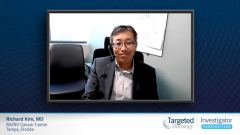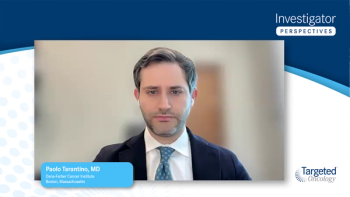
Unresectable HCC: Selecting the Optimal Frontline Therapy
A comprehensive overview of the frontline treatment landscape for patients with unresectable HCC, including those who present with contraindications to standard-of-care therapy.
Episodes in this series
Richard Kim, MD: In terms of the management of first-line treatment for advanced hepatocellular carcinoma [HCC], in the past, sorafenib was the only drug available. Sorafenib is a TKI [tyrosine kinase inhibitor] that blocks many pathways and has been around for over 10 years. A couple of years ago, lenvatinib came onboard. That was based on a study showing that lenvatinib was not inferior to sorafenib. However, it did have a better response rate, longer PFS [progression-free survival], and a different adverse event profile. When those data came out, many of us moved on from sorafenib to lenvatinib. Recently, in the IMbrave150 study, the combination of atezolizumab, which is an immune checkpoint inhibitor, plus bevacizumab, which is an anti-VEGF inhibitor, was shown to be superior compared to TKI sorafenib. Based on that, our standard of first-line treatment has changed to using atezolizumab plus bevacizumab in patients who are eligible to get those agents.
There are other TKIs available in the second or third line of therapy. For example, in the second-line setting, other TKIs called cabozantinib and regorafenib are approved. In the past, immune checkpoint inhibitors, such as pembrolizumab and nivolumab, were approved as single-agent therapy in the second-line setting as well. With all the data emerging, the main question remains how to sequence them. In terms of the mechanism of action, there is a rationale for combining atezolizumab and bevacizumab because most cases of HCC are hypervascular. They overexpress VEGF, and anti-VEGF therapy tends to mitigate the VEGF-mediated immunosuppression. Therefore, in combining that with a checkpoint inhibitor, there’s some synergistic activity with those 2 agents. That was the rationale for doing the IMbrave150 study, which had a positive result showing benefit over sorafenib.
In the first-line setting, based on the Imbrave150 study, the standard should be atezolizumab plus bevacizumab. There are some patients who are not eligible for bevacizumab or atezolizumab: for example, if the patient has a history of bleeding from varices. In the trial, everybody was required to get an EGD [esophagogastroduodenoscopy], and yet the varices prohibited it. Therefore, if at high risk for bleeding from varices, a patient may not be a good candidate for bevacizumab. The other potential patients who are not candidates for that combination have autoimmune disease: if you have Crohn disease or active ulcerative colitis, for example. Giving a checkpoint inhibitor to those patients may not be a good idea. There also is a lack of data in patients with Child-Pugh B disease. If you have a patient with a Child-Pugh score of B8 or B9, can you safely give the combination of atezolizumab and bevacizumab? That’s unclear. I’m sure there will be studies done, but at this moment, there are no safety data on that. That’s another portion of patients who may not be eligible for the combination of atezolizumab plus bevacizumab. If there’s any contraindication to the combination, at least in our practice, we’ll go with a TKI.
Regarding a first-line TKI, there are 2 choices available, sorafenib and lenvatinib. They are very similar because they are both TKIs. Efficacy-wise, even though the OS [overall survival] showed lenvatinib was noninferior, due to the high response rate, the longer PFS, and a slightly better adverse effect profile—meaning that for lenvatinib, you’re dealing with more hypertension and high blood pressure compared to sorafenib, where you deal more with rash and hand-foot skin rashes, which can be cumbersome—many of us have adapted to use more lenvatinib in the first line than sorafenib. In patients who are not a candidate for atezolizumab plus bevacizumab, based on some of the factors I mentioned, a single agent TKI, such as lenvatinib, may be reasonable.
One of the difficulties we see when we treat patients with hepatocellular carcinoma is that unfortunately, many of these patients don’t have a Child-Pugh A score. Most of the studies were conducted with Child-Pugh A patients. If you see a patient with Child-Pugh B score, whether it’s B7, B8, or B9, what do you do in that setting? Atezolizumab plus bevacizumab in the IMbrave150 study was tested in Child-Pugh A patients. Are there data in Child-Pugh B patients? Not that I’m aware of. Therefore, if you want to use that combination in a patient with Child-Pugh B7, there will be a risk to benefit ratio. You’d have to discuss that with the patient and decide what to do.
However, other TKIs such as sorafenib and lenvatinib, or nivolumab as a single agent, have been studied in Child-Pugh B patients. Clearly, anybody Child-Pugh B won’t be similar to patients with Child-Pugh A because they’re going to perform worse no matter what, due to their underlying liver condition. But the safety data show that you can safely use sorafenib, lenvatinib, or nivolumab—the latter based on the CheckMate 040 study—in patients with Child-Pugh score B. Therefore, if you have patients with Child-Pugh score B7, B8 or B9, there are data to support giving TKIs in that setting such as lenvatinib or sorafenib; or possibly using a checkpoint inhibitor as a single agent, such as nivolumab, based on the CheckMate 040 study. There are some data with that. Moving forward, there will be more data collected using the combination of atezolizumab and bevacizumab in patients with Child-Pugh B. But to date, I don’t have any data to support that. However, in those subsets of patient who are not candidates for atezolizumab plus bevacizumab because of Child-Pugh B status, giving a TKI such as sorafenib or lenvatinib, or a single-agent checkpoint inhibitor, is definitely reasonable.
Transcript edited for clarity.

















